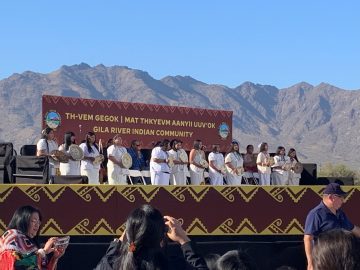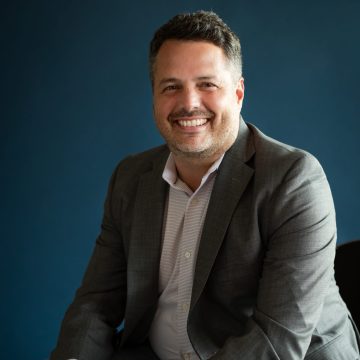Note from Jen
Note from Jen: Acknowledging and learning from the boarding school era
The Bush Foundation was invited to the gathering at Gila River...
DATE
November 20, 2024

It was an extraordinary experience to gather with others at the Gila River Indian Community in Arizona to hear President Biden’s official apology for the government’s role in running Indian boarding schools.
From 1869 to 1971, the United States operated and supported more than 400 boarding schools in states across the U.S., including in the region Bush serves. The boarding school policy was one part of a larger strategy of the U.S. government to strip Native American people of resources and traditional cultures.
As Interior Secretary Deb Haaland describes, the federal government, “took deliberate and strategic actions through federal Indian boarding school policies to isolate children from their families, deny them their identities, and steal from them the languages, cultures and connections that are foundational to Native people.”
The U.S. government doesn’t apologize very often. Even so late in coming, and even for something that caused so much harm for so many people, an apology is a significant step. As Ojibwe Professor and Bush Fellow Anton Treuer explains, it is a needed acknowledgement to support the process of the healing and repair required.
The Bush Foundation was invited to the gathering at Gila River because we are supporting the effort led by the Department of the Interior and Bureau of Indian Affairs to document and share the history of the federal Indian boarding school system, focusing on the personal stories of survivors. This includes a collaboration with the Smithsonian’s National Museum of American History and Library of Congress to establish a federal archive and museum exhibit and traveling exhibits to tour the country.
Beyond the importance of this work to support healing, we hope it will build our country’s ability to understand both past and future policy actions within this context. If more policymakers truly understand the significance of the boarding school era—both the harm to Native people and how the U.S. government benefitted from these policies—it could reopen and reframe a number of policy conversations, such as child welfare, public education, land reclamation, and other issues related to Native self-determination
While these boarding schools were the product of federal policy and largely supported by government money, it is important to note that philanthropy was involved too.
There were not many foundations in existence at the time the policy was established, but a number of individual philanthropists supported the schools and other efforts to assimilate Native people into Euro-American culture. Even Olivia Sage, who is a giant in the history of philanthropy in the U.S. and made lots of good things happen, was a supporter of the Carlisle School in Pennsylvania. I believe she had good intent in her profound concern for Native Americans. She was one of many white social reformers at the time who wanted to save Native people from what seemed to be an inevitable demise. While some reformers earnestly believed they were helping, their sense of what could “help” had terrible consequences.
For philanthropy, this shows how much it matters who gets to define the “problem” and the “solution.” Both the problem and the solution in this case were defined by people other than Native Americans. And the strategies did, in fact, cause extraordinary harm that Native families and communities are still working to recover from more than a century later. And the good intentions of these reformers benefitted federal policy that was deliberately harmful to Native Americans, including the taking of land.
It is one of the most critical truths of philanthropy: good intent is not enough to ensure you are actually doing good. Philanthropy, done well, can be a great force for good in the world. And philanthropy can also cause great harm.
At Bush Foundation, it reminds us of the importance of ensuring the work we fund is done in partnership with the people most impacted by the issues and the people most potentially impacted by a change. We know the consequences of our work can be significant to others. We take this seriously.
I hope you are curious to learn more about this part of our history and its effects on today. I encourage you to learn more about the long-lasting impact of Indian boarding schools by checking out the National Native American Boarding School Healing Coalition. You can also read the two-volume investigative report issued by the U.S. government for the Federal Indian Boarding School Initiative on the Department of the Interior website.
Continue reading
-

News
Opportunity to work with us
As part of our office move later this year, we are exploring possibilities for the build out of the ground floor of the building. We are in the early stages of this and considering different types of operating models and potential partnerships.
-

Staff note
Coordinating the work of our contact hub
We aim to be radically open in all that we do, and that includes being more accessible to more people and sharing what we learn along the way.
-

Staff note
Making every dollar work through impact investing
We have benefitted from the experience of other funders as we developed our impact investing approach. Now we are paying it forward and sharing what we have done and what we have learned.